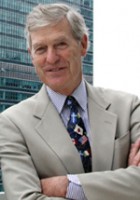President
United Nations Foundation
Timothy E. Wirth is the President of the United Nations Foundation and the Better World Fund. Both organizations were founded in 1998 through a major financial commitment from Ted Turner to support and strengthen the work of the United Nations.
Wirth began his political career as a White House Fellow under President Lyndon Johnson and was Deputy Assistant Secretary for Education in the Nixon Administration. In 1970, Wirth returned to his home state and ran successfully for the U.S. House of Representatives in 1974. He represented Denver suburbs in Congress from 1975-1987. As a first term Congressman, Wirth organized the “Freshman Revolt” in 1975, and with colleagues Norman Mineta, Leon Panetta and Dick Gephardt, he was part of “The Gang of Four” challenging the budget process and developing a high technology and alternative budget in 1982. As Chair of the Communications Subcommittee, he led Congressional initiatives to deregulate the communications industry in America. Congressional legislation became the template for the court-ordered break-up of the AT&T monopoly, and Wirth’s Cable Television Bill of 1984 restructured the television industry. Wirth also authored the Indian Peaks Wilderness Act of 1978.
Wirth was elected to the U.S. Senate in 1986 where he focused on environmental issues, particularly global climate change and population stabilization. In 1988, he organized the historic Hansen hearings on climate change. With his close friend, the late Senator John Heinz (R-PA), he authored “Project 88”, outlining the groundbreaking “Cap and Trade” idea which became law in the Clean Air Act Amendments of 1990. He authored the far-reaching Colorado Wilderness Bill which became law in 1993, and with Senator Alan Simpson (R-WY) he authored major legislation focused on population stabilization.
In Colorado, Wirth organized the Senate Task Force on the Expansion of Major League Baseball, which became a major factor in the awarding of a new expansion franchise to Denver. He led the effort to gain extensive federal funding for the new Denver Airport, and initiated the successful water policy that obviated plans for the Two Forks Dam. He chose not to run for re-election in 1992, citing in a front page cover story in the Sunday New York Times Magazine (August 9, 1992), frustration with the ever increasing role of money in politics to the exclusion of focus on public policy.
Following these two decades of elected politics, Wirth was national Co-chair of the Clinton-Gore campaign, and served in the U.S. Department of State as the first Undersecretary for Global Affairs from 1993 to 1997. He helped organize U.S. foreign policy in the areas of refugees, population, environment, science, human rights and narcotics. He chaired the United States Delegation at the 1994 Cairo Conference on Population and Development, and was the lead U.S. negotiator for the Kyoto Climate Conference until he resigned from the Administration in late 1997 to accept Ted Turner’s invitation to be President of the newly created United Nations Foundation.
As President of the UN Foundation (UNF) since its inception in early 1998, Wirth has organized and led the formulation of the Foundation’s mission and program priorities, which include the environment, women and population, children’s health, and peace, security and human rights. The Foundation also engages in extensive public advocacy, fundraising, and institutional strengthening efforts on behalf of the United Nations. By mobilizing these diverse resources, the UN Foundation works with many public and private partners and manages a variety of campaigns to help solve major problems facing the UN and the world community, including:
- Mobilizing resources in support of the eradication of polio with Rotary International, the Gates Foundation, and the World Bank;
- Initiating a global campaign to diminish the impact of measles with the American Red Cross, the Centers for Disease Control and UN Agencies;
- Stimulating a nationwide grassroots program for the purchase of anti-malaria bed nets (“Nothing But Nets”) with many partners (including the World Health Organization and the National Basketball Association);
- Organizing support for the special needs of adolescent girls within the UN and many private sector partners with Nike and lead UN Agencies;
- Supporting the United Nations Population Fund, and working with Congress to increase U.S. funding and bring greater focus to AIDS prevention;
- Developing standards for better managing tourism’s impact on the environment and contribution to climate change in close partnership with UNESCO and with Expedia and other industry leaders;
- Leading work to develop the UN framework for the post-Kyoto climate negotiations through a close partnership with the UN’s leadership and retired heads of State throughout the world (The Club of Madrid);
- Managing a public-private effort with major segments of the agriculture community and UN agencies for better understanding of the promise, challenge and economics of bioenergy; and
- Advancing aggressive standards for energy efficiency in the U.S. and abroad with the U.S.-centered Energy Future Coalition.
Prior to entering politics, Wirth was in private business in Colorado. The son of teachers, he was a scholarship student and graduate of Harvard College, served as a Harvard “Baby Dean” after graduation, and received a Ph.D. from Stanford University. The recipient of numerous awards and honorary degrees, he also served as a member of the Harvard Board of Overseers. He was recently honored as a Champion of the Earth by the United Nations Environment Programme. Wirth is married to Wren Wirth, the President of the environmentally oriented Winslow Foundation; they have two grown children and five grandchildren

